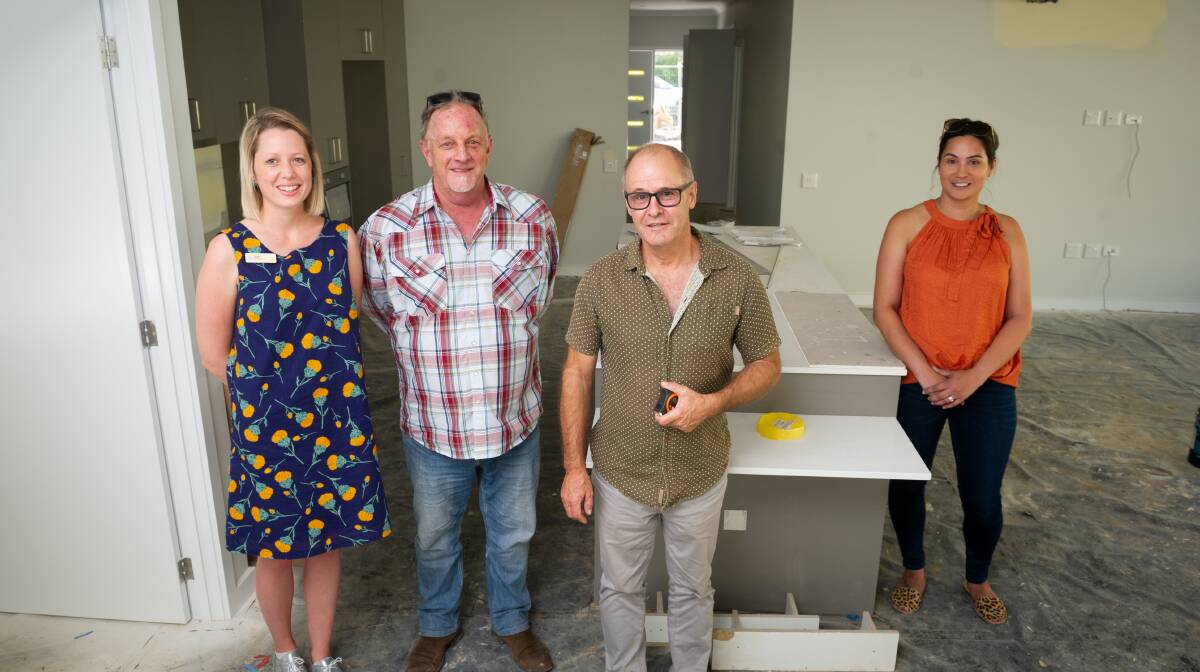
There's a building site on a quiet street in Stirling that looks just like any other new build.
Subscribe now for unlimited access.
or signup to continue reading
If you look closer, though, the extra-wide front door is actually a gateway to a first for Canberra - a specially built home for four people with complex disabilities.
Opening later this month, it's a project that has been seven years in the making, and will be life-changing for the four new housemates who have for years been living either in Canberra Hospital or an aged-care facility.
Keely has been at the hospital the longest, at five years. While young people in aged care homes has made headlines recently, what is less well-known is that younger people with complex disabilities are also living in hospitals, often confined to their ward, because it is so difficult to find appropriate accommodation with the right supports in the community.
There are particular challenges for those who have had a tracheostomy, who require a registered nurse to be with them, the funding of which wasn't covered under the National Disability Insurance Scheme until last year.
Canberra Hospital will not say how many people with disabilities are long-term residents at the hospital, or the average length of time they have lived there, for privacy reasons. But some - like Keely - have been there for years, because there has been no appropriate or safe place to go.
Another housemate Angeline will move from an aged care facility. According to the National Disability Insurance Agency, there are 34 people with disabilities aged under 65 living in aged care in the ACT. Following the interim report from the aged care royal commission last year, the federal government committed to reduce the number of young people in the institutions, a project set to take years.
For Rodney, another housemate, moving to Stirling will end six months in the hospital.
Finding appropriate and safe accommodation for residents with disabilities at Canberra Hospital is the job of social worker Susie Hines. She has been working on this particular project for seven years.
"It's bittersweet," Ms Hines said, because this house will be known as "Alex's House" - named for its first intended resident, who died last year, not long after building had started.
But mostly, Ms Hines says she is excited, and can't quite believe that this is actually happening.
Each housemate has their own bedroom, bathroom, and court yard, personalised both to their needs and their interests. It will be a home, not a facility.
"The whole focus is not to be institutionalised," Ms Hines said.
It's been a long road to this day, with many hurdles along the way. While the NDIS funds accommodation for people with disabilities, it doesn't fund the building of projects like this.
Previous sites for the house were abandoned after objections from neighbours, and even the banking royal commission slowed investment.
"It was a real fight," said Grieg Chapman, advocate at ACT Disability Aged Carer Advocacy Service (ADACAS).
Mr Chapman is the quiet force behind the project, who Ms Hines contacted three years ago, at the end of her tether, having exhausted all existing options in Canberra.
"None of this would have happened without Grieg and ADACAS," Ms Hines said.
"He's ridden the wave with me and the families."
READ MORE:
The plan was hatched for a purpose-built house, that would allow supported independent living, with space for carers, who will be there around the clock.
Mr Chapman involved Greg Dalla, a property developer and owner of the Disability Housing Solutions website, from Queensland, who found investors to build the house and will be the property manager.
Also on board is National Community Care, who will employ and coordinate the team of carers and staff, who will help the residents to live as independently as possible.
Mr Chapman says Alex's House is a symbol of what can be achieved when many groups work together, and hopes it will be the first of many in Canberra.
A Canberra Health Services spokeswoman said the organisation recognised that finding suitable accommodation can be a challenge and result in prolonged hospital stays.
"This challenge is not unique to the ACT. The number of patients and the length of time they have been in hospital whilst awaiting suitable accommodation varies and is based on patient's individual care needs," the spokeswoman said.
"Canberra Health Services is committed to working with external agencies, patients and their families/carers to facilitate timely transfer from hospital into the community."
- The Canberra Times is following the opening of Alex's House and will have more stories, including with the residents, in the coming months.


